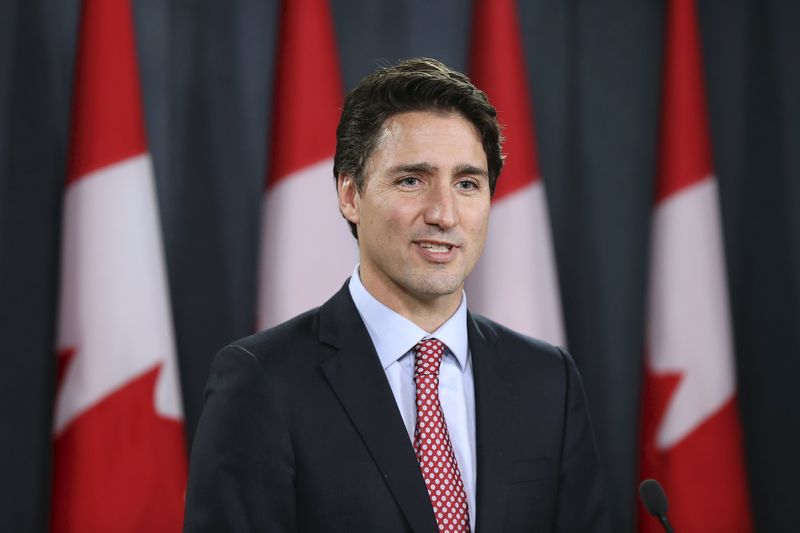By Nia Williams (NYSE:WMB) and Rod Nickel
CALGARY, Alberta/WINNIPEG, Manitoba, July 2 (Reuters) - An indigenous-led group plans to offer to buy a majority stake in the Trans Mountain oil pipeline from the Canadian government this week or next, a deal that could help Prime Minister Justin Trudeau mitigate election-year criticism from environmentalists.
The group, called Project Reconciliation, aims to submit the C$6.9 billion ($5.26 billion) offer as early as Friday, managing director Stephen Mason told Reuters, and start negotiations with Ottawa two weeks later.
Project Reconciliation said the investment will alleviate First Nations poverty, a watershed for indigenous people who have historically watched Canada's resources enrich others.
Expansion would triple capacity of the pipeline carrying crude from Alberta to British Columbia's coast, helping resuscitate an industry depressed by low prices and congested pipelines.
Trudeau's government, which bought the pipeline last year after its owner, Kinder Morgan (NYSE:KMI) Canada KML.TO , gave up on trying to get the expansion approved, has already been touting First Nations participation. A deal ahead of an October election could ease criticism from voters who have complained of broken promises on the environment and aboriginal rights.
Still, not all First Nations groups are on board. Some in British Columbia have pledged to keep fighting expansion of Trans Mountain, even with blockades and protests, saying ownership makes no difference to the risk of oil leaks.
"The greatest hope the government can have is they neutralize this topic. Imagine if a multinational gets ownership of the pipeline, or an indigenous consortium. The indigenous (option) is way less provocative," said Ken Coates, professor of public policy at University of Saskatchewan.
When Trudeau approved the pipeline in June, he said his government would immediately consult indigenous communities on how they can benefit, including potentially buying the pipeline.
Mason declined to say how many communities support Project Reconciliation.
"There is a vocal minority (against the project). The majority are in favour especially if they have material ownership and a place at the table that allows them to be involved with environmental aspects," Mason said. "If we own it, chances are we can quiet down the opposition."
Project Reconciliation hopes to buy 51% of the pipeline this year for C$2.3 billion and roughly half the expansion project for C$4.6 billion. It would finance the deal through bank loans underwritten by commitments from oil shippers. The government would retain 49 percent.
Once expansion is complete, it intends to invest C$200 million of annual proceeds into an indigenous sovereign wealth fund.
"We have conversations about climate change. But tell me at what level climate change is a discussion when we have a lot of our people who are starving," Delbert Wapass, Project Reconciliation's executive chairman told a packed crowd at Calgary's Petroleum Club.
FOR AND AGAINST
Indigenous people who support buying Trans Mountain say it offers a rare opportunity to own money-making oil infrastructure.
Before Chief Tony Alexis was born, Trans Mountain was built underground on Alexis Nakota Sioux Nation traditional land near Edmonton, Alberta, where the pipeline starts.
In the 66 years since, the community has received no benefits, Chief Alexis said, only risk. Now it could cash in.
"Our people have been ready to be in business for a long time," Alexis said. "If we do this right, this is going to be a template for the future."
Alexis is part of Iron Coalition, another indigenous group seeking to buy between half and 100% of the pipeline once it is built in 2022. It is discussing options with banks and plans to direct future profits to Alberta indigenous groups that join.
At the other end of the pipeline 1,150 kilometres (715 miles) away, British Columbia indigenous communities are digging in for a fight.
"Our sacred obligation is that we are stewards of this land, this water and our people," said Chief Leah George-Wilson of Tsleil-Waututh First Nation, based along Burrard Inlet opposite Westridge Marine Terminal where Trans Mountain ends.
Tsleil-Waututh plans to appeal Trudeau's approval of Trans Mountain's expansion over concerns about spills and tanker traffic, George-Wilson said.
Coates, the University of Saskatchewan professor, said indigenous participation in the pipeline could allow Trudeau's Liberals to retain more urban votes that will be critical to the election's outcome.
The government is already promoting Trans Mountain as a means to improve aboriginal lives.
"Meaningful economic participation by indigenous peoples is an important way to respect ... people who are actually impacted along the line," Finance Minister Bill Morneau said last month.
Conservatives have not decided how they would sell the pipeline if they win the election, said MP Shannon Stubbs of Alberta who has criticized the government over natural resources issues.
The Alberta provincial government said it welcomed interest from indigenous communities in becoming partners in the energy sector. British Columbia opposes the pipeline expansion, however, and Environment Minister George Heyman said indigenous ownership would not change its concerns about spills.
Opponents are planning litigation, blockades and protests, said Grand Chief Stewart Phillip of the Union of BC Indian Chiefs.
"Who owns the pipeline is not the issue. It's what goes through the pipeline," he said. ($1 = 1.3114 Canadian dollars)
